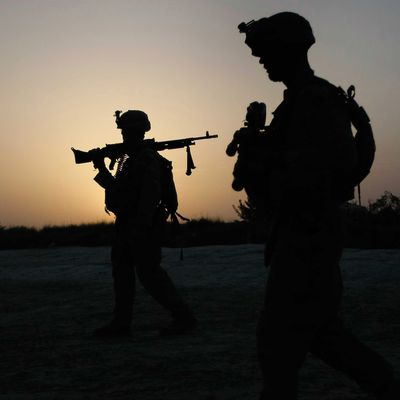
The United States has had troops stationed in Afghanistan for 19 years. That nearly two-decade-long occupation has cost our nation roughly $1 trillion and 2,300 American lives. Nevertheless, throughout wide swathes of the country, the Taliban has persisted.
Throughout America’s longest war, top Pentagon and civilian officials deliberately misled the public about the endeavor’s likelihood of success in a bid to insulate their adventure from the threat of democratic rebuke. As the Washington Post reported last fall, summarizing the upshot of various confidential government documents it had obtained, “it was common at military headquarters in Kabul — and at the White House — to distort statistics to make it appear the United States was winning the war when that was not the case.” John Sopko, the head of the Office of the Special Inspector General for Afghanistan Reconstruction, put the point more plainly: “The American people have constantly been lied to.”
Amid the lies, war crimes, tens of thousands of civilian deaths, egregious corruption, and revival of the Afghan opium trade, some positive developments have accompanied the U.S. invasion. Afghan women have made some real gains in their personal liberty, however limited and fragile. But the U.S. has neither the will nor the capacity to deny the Taliban a role in governing the country. The peace deal that the Trump administration struck with that group in February was an acknowledgment of the inevitable; as such, it was a productive step forward. Under the agreement’s terms, the U.S. will fully withdraw its troops in 14 months, so long as the Taliban upholds its commitments to, among other things, bar Al Qaeda from operating in areas under its control, and participate in “Intra-Afghan talks” with the government in Kabul, opposition politicians, and various representatives of civil society about the future governance of the country.
To uphold its end of the bargain, the Trump administration plans to reduce America’s troop presence from its current level of 8,600 to 4,500 by this autumn.
But this week, a bipartisan group of House lawmakers erected new barriers to that withdrawal. As the Intercept’s Glenn Greenwald notes:
Last night, the House Armed Services Committee voted overwhelmingly in favor of an amendment — jointly sponsored by Democratic Congressman Jason Crow of Colorado and Congresswoman Cheney of Wyoming — prohibiting the expenditure of monies to reduce the number of U.S. troops deployed in Afghanistan below 8,000 without a series of conditions first being met.
The imposed conditions are by no means trivial: for these troop reductions from Afghanistan to be allowed, the Defense Department must be able to certify, among other things, that leaving Afghanistan “will not increase the risk for the expansion of existing or formation of new terrorist safe havens inside Afghanistan” and “will not compromise or otherwise negatively affect the ongoing United States counter terrorism mission against the Islamic State, al Qaeda, and associated forces.”
The Crow/Cheney amendment to the National Defense Authorization Act (NDAA) last night passed by a vote of 45-11.
There may be sound reasons to alter the timetable for a U.S. withdrawal. If the Taliban is in violation of its commitments under the February agreement — and if delaying withdrawal by a few weeks would somehow yield a better, more durable peace for the people of Afghanistan — then making America’s longest war a bit longer would be well advised. (Although it’s hard to believe that 8,000 U.S. troops can achieve in months what tens of thousands failed to achieve in 19 years.)
Regardless, the House’s conditions are senselessly prohibitive. It’s difficult to see how one could ever withdraw military forces tasked with preventing the formation of terrorist safe havens without increasing the risk of “the expansion of existing or formation of new terrorist safe havens.” But that is not a rational basis for prolonging a 19-year war. The U.S. cannot maintain military occupations in every country where Islamist militants could conceivably gather and plot violence. Nor should it. As COVID-19 and climate change are making clear (or should be), terrorism is a relatively trivial threat, one that has diverted precious resources from pandemic prevention, green-energy transition, and other efforts necessary for mitigating the genuinely catastrophic challenges to Americans’ safety and security.
Congress’s (uncharacteristic) decision to interfere with the executive branch’s conduct in a foreign war was not explicitly tied to recent revelations concerning Russia’s apparent efforts to place bounties on U.S. troops in Afghanistan. But given the prominence of that story, it seems reasonable to worry that the issue influenced the House’s action. Especially since one of the amendment’s sponsors suggested that the U.S. must respond to Russia’s treachery by dispelling any question of America’s “will” to defend its interests.
Congress is right to investigate allegations of Russian targeting of U.S. troops and the Trump administration’s handling of relevant intelligence. But Russia’s actions have no bearing on the wisdom of prolonging an unwinnable war. If anything, the vulnerability of U.S. troops to such attacks constitutes an argument for quicker withdrawal. Extending military quagmires to demonstrate our resolve to Moscow was crazy when it was still the world’s second greatest power; doing so now that Russia is a declining petrostate with modest regional influence would be utter madness.






























